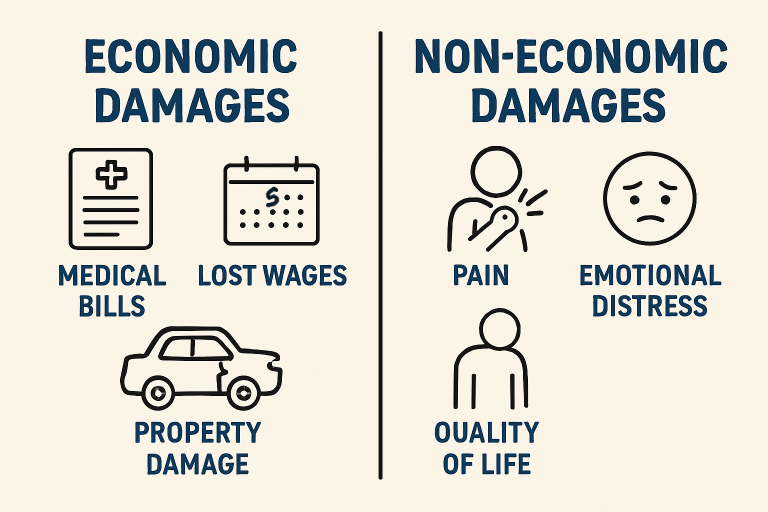Key Takeaways
- Economic damages encompass measurable losses, including hospital bills, lost earnings, and property damage.
- Non-economic damages compensate for pain, mental anguish, and the loss of enjoyment of life.
- Nevada’s modified comparative fault approach means your compensation could be reduced if you contributed to the accident.
- The multiplier and per diem methods are commonly used to assign a dollar value to non-economic damages.
Understanding how compensation is determined after an injury in Las Vegas can make a significant difference in the outcome of your claim. Individuals who suffer harm due to another’s negligence face not just medical recovery, but also the challenge of securing adequate compensation to cover their losses. Working with an experienced law firm like Friedman Injury Law Top-Rated Vegas Personal Injury Firm can be crucial to navigating these complexities and ensuring your interests are protected.
Knowing what factors influence settlement amounts—and how Nevada law treats fault—will empower you to seek the compensation you truly deserve. Calculating personal injury compensation involves more than simply tallying up receipts; Nevada employs specific legal standards and methodologies designed to balance fairness if multiple parties were involved or if your injuries impact your quality of life over the long term.
Economic Damages: The Tangible Losses
Economic damages serve as the backbone of most personal injury settlements, focusing on concrete financial losses. In Las Vegas, these commonly include:
- Medical Expenses: Including both current and projected future medical bills, surgical procedures, prescription medications, physical therapy, and assistive equipment.
- Lost Wages: Compensation for the income you have missed due to the inability to work during recovery, and potential loss of future earnings if your injury is long-term.
- Property Damage: Costs to repair or replace items such as your car or other personal property damaged in the incident.
Collect thorough records and keep documentation for all costs associated with your injury. This helps your attorney and the insurance provider clearly assess the value of this portion of your claim.

Non-Economic Damages: The Intangible Losses
Some of the greatest impacts from an accident are those that are harder to put a price on. Non-economic damages seek to compensate for:
- Pain and Suffering: Ongoing physical pain experienced because of your injuries and emotional distress.
- Loss of Enjoyment: Inability to participate in hobbies, sports, or everyday activities that you enjoyed prior to your accident.
- Emotional Distress: Anxiety, depression, PTSD, and other psychological injuries sustained because of the incident.
Since these losses are subjective, courts and insurance adjusters use specific formulas to determine a fair amount. The key is in showing—through medical records, expert testimony, and your own statements—the real, ongoing effect of your injuries.
Methods for Calculating Non-Economic Damages
Non-economic damages don’t come with receipts or clear dollar amounts, so insurance companies and courts frequently rely on two main approaches:
Multiplier Method: This method multiplies your total economic damages by a number between 1.5 and 5. More serious injuries with lifelong impacts are assigned a higher multiplier. For example, if your medical bills and wage loss total $60,000 and a multiplier of 3 applies due to severe pain, your non-economic damages could be $180,000. This approach helps standardize awards while acknowledging that some injuries profoundly impact lives in unpredictable ways.
Per Diem Method: Your attorney might argue for a set daily rate for each day you spend recovering and in pain. The per diem amount is then multiplied by the number of recovery days. For instance, a $200 daily rate over 120 days would result in $24,000 for non-economic damages.
Modified Comparative Fault in Nevada
Nevada’s modified comparative fault doctrine governs cases where multiple parties share responsibility for the accident. If you’re found partially responsible (but less than 50% at fault), your damages will be reduced by your degree of fault. For example, if you were 25% responsible, your total compensation would be reduced by 25%. However, if you’re found 50% or more at fault, you are barred from recovering any damages.
This rule often leads to negotiations and disputes in courtrooms regarding who bears how much of the blame. A skilled personal injury attorney can help present your case in a way that accurately reflects the circumstances—and protects your right to fair compensation.
Factors Influencing Compensation Amounts
Several variables play a role in determining how much compensation an injury victim ultimately receives in a Las Vegas personal injury case:
- Severity and Permanence of Injuries: Significant injuries, such as those requiring surgery, resulting in permanent disability, or necessitating extended medical care, generally yield higher settlements or verdicts.
- Impact on Quality of Life: Injuries that limit your ability to work, participate in family life, or engage in activities you once enjoyed will increase non-economic damages.
- Insurance Policy Limits: The responsible party’s insurance coverage may place a ceiling on what is recoverable, even if your damages exceed those limits.
Other influencing factors include the credibility of witnesses, whether liability is clear, and your ability to provide comprehensive evidence supporting both economic and non-economic losses.
Seeking Legal Assistance
Calculating and negotiating for full compensation requires more than submitting a claim. Each injury case is unique—facts, local statutes, and insurance company tactics can dramatically alter the outcome. Consulting with an attorney ensures every aspect of your economic and non-economic damages is properly valued and presented. Legal professionals also help you navigate potential pitfalls in comparative fault claims, and they negotiate aggressively on your behalf if the insurance company tries to minimize your settlement.
By understanding how compensation is determined and what factors influence your total recovery, you place yourself in a much stronger position to get the justice you deserve after an injury in Las Vegas. Utilize reputable resources and experienced legal help to maximize your chance of a successful claim.